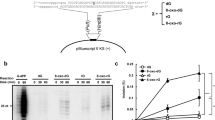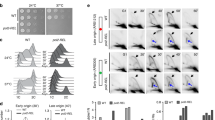Abstract
The tumor suppressor p53 plays a critical role in the regulation of the cell cycle and the maintenance of genetic stability. The 3′→5′ exonuclease activity of p53 has recently been recognized as a novel biochemical function of this molecule, but the biological significance of this activity remains elusive. Using an in vitro DNA replication assay with purified human DNA polymerases, p53 protein, and defined DNA primer/templates, we demonstrated that the wild-type (wt) p53 protein, but not the mutant p53 protein, specifically enhanced the DNA replication fidelity of polymerase (pol) α, an enzyme that lacks 3′→5′ exonuclease activity. The misincorporation of non-complementary deoxynucleotides into DNA by pol α was substantially decreased by p53. In contrast, wt p53 showed no significant effect on replication fidelity or the rates of DNA synthesis by human pol ε or the bacterial enzyme pol I. Inhibition of 3′→5′ exonuclease activity by guanosine monophosphate (GMP) abolished the ability of p53 to enhance the replication fidelity of pol α. Quantitative analyses revealed that the 3′→5′ exonuclease activity of p53 effectively removed mismatched nucleotides from DNA in preference over matched nucleotides. Furthermore, study in intact cells revealed that the wt p53 protein was co-localized with DNA synthesis activity in S phase cells. These results suggest a possibility that the 3′→5′ exonuclease of the wt p53 protein might provide the proof-reading function for DNA pol α. The preferential excision of mismatched nucleotides from the replicating DNA strand appears to be a potential biochemical mechanism by which p53 enhances DNA replication fidelity and thereby helps to maintain genomic integrity.
This is a preview of subscription content, access via your institution
Access options
Subscribe to this journal
Receive 50 print issues and online access
$259.00 per year
only $5.18 per issue
Buy this article
- Purchase on Springer Link
- Instant access to full article PDF
Prices may be subject to local taxes which are calculated during checkout
Similar content being viewed by others
Author information
Authors and Affiliations
Rights and permissions
About this article
Cite this article
Huang, P. Excision of mismatched nucleotides from DNA: a potential mechanism for enhancing DNA replication fidelity by the wild-type p53 protein. Oncogene 17, 261–270 (1998). https://doi.org/10.1038/sj.onc.1201946
Received:
Revised:
Accepted:
Published:
Issue Date:
DOI: https://doi.org/10.1038/sj.onc.1201946
Keywords
This article is cited by
-
Fidelity of DNA replication—a matter of proofreading
Current Genetics (2018)
-
The exonuclease activity of hPMC2 is required for transcriptional regulation of the QR gene and repair of estrogen-induced abasic sites
Oncogene (2011)
-
p53 in mitochondria enhances the accuracy of DNA synthesis
Cell Death & Differentiation (2008)
-
Exonucleolytic degradation of RNA by p53 protein in cytoplasm
Journal of Molecular Medicine (2008)
-
p53 in recombination and repair
Cell Death & Differentiation (2006)



